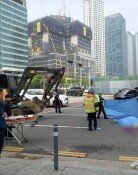Distrust in real estate policy
Distrust in real estate policy
Posted July. 04, 2020 07:39,
Updated July. 04, 2020 07:40
In the face of growing concern over the real estate market, President Moon Jae-in instructed his administration “to increase burden on speculative home owners, including owners of multiple homes” on Thursday. The president took action in person, as the public has become increasingly jittery amid growing uncertainty over housing prices despite the government’s June 17 measure that includes the introduction of a permission-based real estate transaction system in southern Seoul.
The most notable among President Moon’s instructions is that “The government should increase supply even by discovering new housing supplies.” The government has not only increased taxes and imposed more restrictions on housing loans, but also continued supplying new homes. According to the Land, Infrastructure Transport Ministry, more than 290,000 new apartments and homes have been supplied to people in the Greater Seoul region every year, including 70,000 in Seoul, over the past three years. The government also announced a plan to construct additional 300,000 homes in five Phase-3 New Towns in the Greater Seoul region, and extra 70,000 homes at various locations within the capital city, including an unused rolling stock maintenance depot in Yongsan, central Seoul.
Despite the government’s continuous measures, apartment prices are soaring in Seoul apparently due to lack of supply. Most of the homes that the government supplies to newly married couples are mostly public rental homes or are located in marginal areas, and hence they fail to meet the expectations of middle-class people in Seoul. The government has been strengthening regulations on the redevelopment of aged urban districts and reconstruction of aged apartment complexes, saying that such housing construction projects stimulate speculative demand and cause housing prices in surrounding areas to soar. However, there are no viable measures available to supply more new homes, other than redevelopment of aged districts and reconstruction of aged apartment complexes, in Seoul. The government should seek to find a way to promote redevelopment and reconstruction projects, while collecting extra capital gains that homeowners earn from such projects.
It is also problematic that owners of multiple homes are levied with tens of thousands of dollars in taxes, while rental housing companies and registered landlords that own dozens or hundreds of homes are paying almost no taxes. The government needs to provide a way of exit from the market to registered private rental homeowners, including temporary lifting of the duration of obligatory home rent (required for tax benefit) while increasing ownership taxes on owners of multiple homes. The market has seen increased resistance to new policy measures due to constantly mounting regulations. Unless the government puts in place a bold and decisive measure with the kind of determination that “this is the ultimate last,” and dumps the negligent mindset that “it could further introduce additional regulations,” the incumbent administration may end up becoming “an administration that completely failed in realty policy.”
The Moon Jae-in administration declared a “war against real estate speculation” since the early days after its inauguration, but many of ranking officials and leaders of the ruling party, the presidential office and the government are still owners of multiple homes. Presidential Chief of Staff Noh Young-min himself still owns two homes: one in Banpo-dong in Seoul’s Seocho district and the other in Cheongju City in North Chungcheong Province. Noh initially said he put his home in Banpo for sale, but changed his plan and chose to sell the one in Cheongju 50 minutes later. Critics say that a core member of the administration has thus demonstrated the diehard tradition of “never failing investment in Gangnam.” We cannot criticize people for their legitimate ownership of property and their right to choose even if they are government officials. But unless the leadership set models and become exemplary citizens themselves, the government’s measures to stabilize the real estate market will end up in failure.







